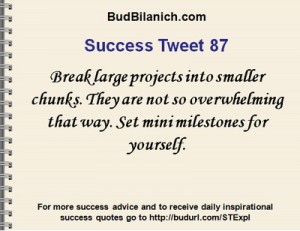 Jill Koenig, one of my on line friends, posted this bit of wisdom on her Facebook page yesterday…
Jill Koenig, one of my on line friends, posted this bit of wisdom on her Facebook page yesterday…
“To accomplish big things, you must do the small things. This overcomes inertia. To accomplish the small things, visualize the big picture outcome. This overcomes overwhelm.”
That’s exactly the kind of career advice I’m talking about in Tweet 87. Small steps and mini-milestones will help you overcome the inertia that can stop you from beginning a big project. At the same time, you need to keep focused on the big picture to avoid being overwhelmed by the sheer number of small tasks involved in completing a big project.
I’ve written 14 books. Writing a book is a huge project. It can be difficult to get started. I’ve found that breaking down the writing process into manageable chunks helps me to get started, and keep my momentum. My latest book is called, Your Career Success GPS: A Common Sense Roadmap for Becoming the Career Success You Are Meant to Be! I am in the final stages of getting it ready for the printer. Here’s how I went about writing Your Career Success GPS.
First, I created an overall model of career success. This model had four main components:
- Clarify the purpose and direction for your life and career.
- Commit to taking personal responsibility for your life and career success.
- Build unshakeable self-confidence.
- Get competent in four areas: creating positive personal impact, outstanding performance, dynamic communication and relationship building.
Then I spent time figuring out the career advice that would tell readers exactly what they need to do to apply each of these components to create the life and career success they want and deserve.
Clarity
- Create clarity by figuring out what success means to you personally.
- Create clarity by creating a vivid mental image of yourself as a success.
- Create clarity by determining your personal values.
Commitment
- Take personal responsibility for your life and career success.
- Set and achieve high goals.
- Choose to react positively to the people and events in your life; especially the negative ones.
Self-confidence
- Choose to be optimistic.
- Face your fears and act.
- Surround yourself with positive people.
- Find a mentor to help you create your success.
- Share your knowledge and wisdom through mentoring others.
Competence
- Create positive personal impact by creating and nurturing your unique personal brand.
- Create positive personal impact by being impeccable in your presentation of self; in person and on line.
- Create positive personal impact by knowing the following the basic rules of business etiquette.
- Become an outstanding performer by keeping your skills up-to-date by becoming a lifelong learner.
- Become an outstanding performer by learning to manage your time and life.
- Become an outstanding performer by living a healthy life-style.
- Become a dynamic communicator by demonstrating strong conversation skills.
- Become a dynamic communicator by writing clearly and succinctly.
- Become a dynamic communicator by mastering public speaking skills.
- Build relationships through self awareness. Use this knowledge to better understand others.
- Build relationships by paying it forward; give with no expectation of return.
- Build relationships by using conflict to strengthen, not weaken, relationships with the important people in your life.
Once I had these 23 ideas down – and this took quite a bit of thinking and work – I was ready to begin writing. Each chapter became a mini-milestone. Writing 23 focused chapters was easier for me than writing a book on such a large and complex topic as career success. You can see the fruits of my labor by downloading and reading Your Career Success GPS.
This process works for me, primarily because I break the overwhelmingly large project of writing a book into a series of small steps that are relatively easy to accomplish. That’s the beauty of the career advice in Tweet 87.
One more piece of career advice. I always start large projects late in the afternoon. I do this to create momentum. Even though I barely scratch the surface of the project, I get up the next day ready to go because I have accomplished something on the project and have momentum on my side. Try this the next time you are faced with a big project. It works.
The common sense career success coach point here is simple. Successful people are good at taking on and accomplishing big projects. They follow the career advice in Tweet 87 in Success Tweets. “Break large projects into small chunks. They are not so overwhelming that way. Set mini-milestones for yourself.” Jill Koenig nails it when she says, “To accomplish big things, you must do the small things. This overcomes inertia. To accomplish the small things, visualize the big picture outcome. This overcomes overwhelm.” Small steps in the right direction are the best way to get big things done. One final piece of career advice here: start big projects late in the afternoon. You’ll have momentum on your side when you get to work the next day.

Speak Your Mind